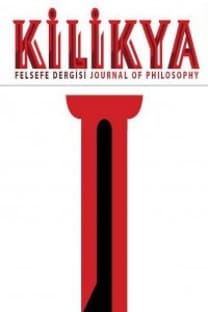G. W. F. Hegel’in Estetik Üzerine Dersleri ve Sanatın Sonuna İlişkin Tezler
G. W. F. Hegel’in 1820’de gerçekleştirdiği Estetik, Güzel Sanatlar Üzerine Dersler’i bugün hâlâ estetik üzerine en çok tartışılan tezlerden biri olan sanatın sonu iddiası ile sıklıkla gündeme gelmektedir. Kuşkusuz Hegel’in notlarının böylesi bir iddiaya ev sahipliği yapıp yapmadığı çok tartışılan felsefi bir meseledir. Kimilerine göre Hegel, romantik sanatın estetiğin sonunu getirdiğini ima etmiştir, kimilerine göreyse son fikri modern dönemde sanatın sonuna dair bir işaret olarak okunmalıdır. Kuşkusuz Hegel’in estetik üzerine düşüncelerinin güncel sanat üzerine yapılan tartışmalarla ilişkilendirilmesi birçok bakımdan ufuk açıcıdır; ancak bağlamından kopmadan, yani bir bakıma son fikrinin Hegel estetiğinde nasıl tecelli ettiği tartışılmadan bu ilişkiyi kurmak bizi Hegel felsefesinden uzağa doğru sürükleyecektir. Bu yanlış anlamayı gidermek adına aşağıdaki incelemede öncelikle Hegel’in ilgili görüşlerine açıklık getirmeyi amaçlamaktayım. Ardından Hegel’e atfedilen kimi görüşlerin izini sürerek bunların geçerliliklerini ortaya koymaya çalışacağım. Son olarak da Hegel estetiğinin ana hatlarına tekrar dönerek sanatın sonu tezinin nasıl yorumlanabileceği üzerine kendi düşüncelerimi dile getireceğim
Anahtar Kelimeler:
Estetik, Sanatın Sonu, Güzel, Tarihsellik, İdea
G. W. F. Hegel’s Lectures on Aesthetics and the Theses on the End of Art
G. W. F. Hegel’s Lectures on Aesthetics and Fine Art (1820) are still one of the most important issues on the claim of the end of art, which is one of the most debated theses on aesthetics today. Undoubtedly, Hegel’s notes hosting such a claim is a crucial, philosophical subject. According to some critics, Hegel hinted that romantic art brought about the end of aesthetics, while according to others the concept of end should be read as a sign of the end of art in the modern period. Certainly, the association of Hegel’s reflections on aesthetics with the debates on contemporary art is in many ways valuable, however one has to deal with the concept of end in Hegel’s aesthetics without leaving the limits of the context entirely, otherwise one would distance oneself from Hegel’s philosophy. In this article, in order to eliminate some misunderstandings on the relevant issue, I aim to clarify Hegel’s own ideas in Lectures on Aesthetics and Fine Art. Then, I will try to reveal the validity of some of the ideas attributed to Hegel’s aesthetics. Finally, I will return to the outline of Hegel’s aesthetics and express my thoughts on how to interpret the end of art thesis.
Keywords:
Aesthetics, the End of Art, Beauty, Historicity, Idea,
___
- Croce, B. (1978). Aesthetic (D. Ainslee, Çev.). Boston, MA: Nonpereil.
- Danto, A. C. (1984). The End of Art. B. Lang (Ed.), The Death of Art içinde (ss. 5-35). New York: Haven.
- Danto, A. C. (1986). The Philosophical Disenfranchisment of Art. New York: Colombia Üniversitesi Yayınları.
- Danto, A. C. (1998). After the End of Art: Contemporary Art and the Pale of History. Princeton: Princeton Üniversitesi Yayınları.
- Danto, A. C. (2003). The Abuse of Beauty: Aesthetics and the Concept of Art. Chicago: Open Court
- Hass, A. (2013). Hegel and the Art of Negation: Negativity, Creativity and Contemporary Thought. Londra, New York: I. B. Tauris.
- Henrich, Dieter. (1974) “The Contemporary Relevance of Hegel’s Aesthetics”, Stuttgarter Hegel-Tage 1970 (Hegel-Studien, Beiheft 11), der. H. G. Gadamer, Bonn.
- Hegel, G. W. F. (1970). Vorlesungen über die Ästhetik, Werke In Zwanzig Bänden, Frankfurt am Main: Surkamp Verlag.
- Hegel, G. W. F. (1975). Aesthetics, Lectures on Fine Art (T. M. Knox, Çev.). Oxford: Clarendon Üniversitesi Yayınları.
- Hegel, G. W. F. (1977). Phenomenology of Spirit (A. V. Miller, Çev.). Oxford: Oxford Üniversitesi Yayınları.
- Hegel, G. W. F. (1994). Estetik, Güzel Sanatlar Üzerine Dersler (Cilt I) (T. Altuğ, H. Hünler, Çev.). İstanbul: Payel Yayınları.
- Hegel, G. W. F. (2003). Alman İdealizmi II: Hegel, der. Güçlü Ateşoğlu, Doğu-Batı Yayınları.
- Geulen, E. (2006). The End of Art: Readings in a Rumor After Hegel (James McFarland, Çev.) Stanford, Calif: Stanford Üniversitesi Yayınları.
- Yayın Aralığı: Yılda 2 Sayı
- Başlangıç: 2014
- Yayıncı: Eray Yağanak
Sayıdaki Diğer Makaleler
Kierkegaard’nun Öznel-Nesnel Hakikat Ayrımı Temelinde Tekil Birey Anlayışı
Wittgenstein’ın Birinci Dönem Düşüncelerindeki Resim Kuramı ve Anlamla İlgili Sorunlar
Kant’ın Opus Postumum Adlı Yapıtında Geçiş Sorunu
G. W. F. Hegel’in Estetik Üzerine Dersleri ve Sanatın Sonuna İlişkin Tezler
Anlamın Doğası ve Ruhbilimselci Yaklaşım Sorunu
İnsan Etkinliğinin Doğası: Arendt’in Marx Üzerine Görüşlerinin Eleştirel Bir Değerlendirmesi
Tıp Etiğinden Bio-Etiğe: Fritz Jahr
Doğrudan Çıkarımlardaki Bazı Mantıksal Eşdeğerlik İlişkileri
Pyrrhus ile Cineas’ta Tasarı ve Aşkınlık Temelinde Simone De Beauvoir’ın Carpe Diem Eleştirisi
İnsan, İnsancıllık (Hümanizm) ve İnsan Hakları: İnsancıllık Eleştirisi Üzerine
